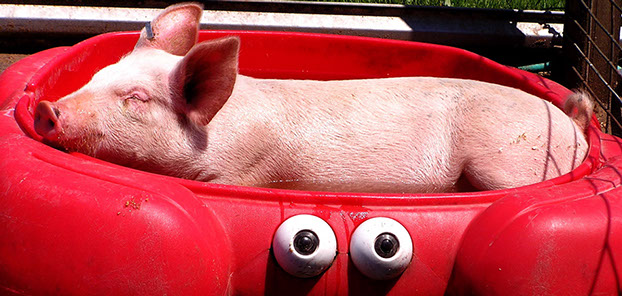Keeping a pig as a house pet is becoming more and more popular. People assume that a pig will be easy to take care of and much like a cat or dog. While this can be true, it is important to understand the needs of a pig and to have realistic expectations. There are many pros and cons that must be considered before entering in to a commitment such as this. Although a pig can be a very exciting and rewarding pet, it also requires a lot of time and effort.
Each pig will have his or her own unique personality. Pigs are highly intelligent in fact, they are forth on the intelligence list only after humans, primates and dolphins and whales! They are kind and sensitive animals (especially if they have been spayed or neutered), they are easily trained, affectionate, curious, playful, clean, generally quiet, odor free, and usually non-allergenic, due to their bristly hair. Pigs can be litter box trained and if they do go outside they will normally only use one corner of the yard. They can live to be 10-20 years old and may weigh over 130 pounds.
Along with these positive characteristics come some cautions when keeping a pig as a house pet. For example, because they are highly intelligent, pigs may become bored easily and will find creative ways to entertain themselves, often being very destructive in the process. A bored pig may root up carpeting or linoleum floors, eat drywall, overturn house plants and root through the dirt.
Pigs may become aggressive around 18 months of age as they begin to vie for dominance (the place of “top pig”) among other pets and family members. This dominance aggression is also seen in dogs, therefore with any pet it is important to set boundaries and rules and to communicate with your animal that you are in charge. Pigs respond well to praise but do not do well with physical punishment.
Pigs are very determined when it comes to food. They can learn to open the fridge, cupboards, pantry and wherever else food may be kept. They can also become demanding, they may beg for food and even get aggressive with kids that have food.
As a natural instinct pigs will root in order to obtain essential vitamins and minerals from the ground. An area of soft dirt should be provided in the yard so they can fulfill their need to root. If your landscaping is important to you, you may want to reconsider having a pig as a pet.
Pigs are very susceptible to bronchitis and pneumonia and due to their tiny lung size they can die very quickly from these conditions. This can be caused by weather as well as stress. Veterinary care for a pig can be very expensive and an experienced vet that can provide proper care for a pig can be difficult to find. Be aware that local zoning laws may not allow you to keep a pig as a pet. As well, it is very important that you spay or neuter your pet pig. Females that have not been spayed will go in to heat every 21 days and will become very moody and unneutered males will have a strong, foul odor.
Once you have weighed the options and have decided to adopt a pig, be sure that you visit a conscientious, reputable breeder, or, better yet, adopt a pig from a shelter.
You will need good quality pig food and to provide your pig with regular vaccinations, hoof and tusk trims, and to have him or her spayed or neutered. Regular access to the outdoors for exercise is also a necessity.
Pigs are very social animals and will need a lot of attention and interaction. If possible you should consider keeping more than one pig.
Image by liz west


